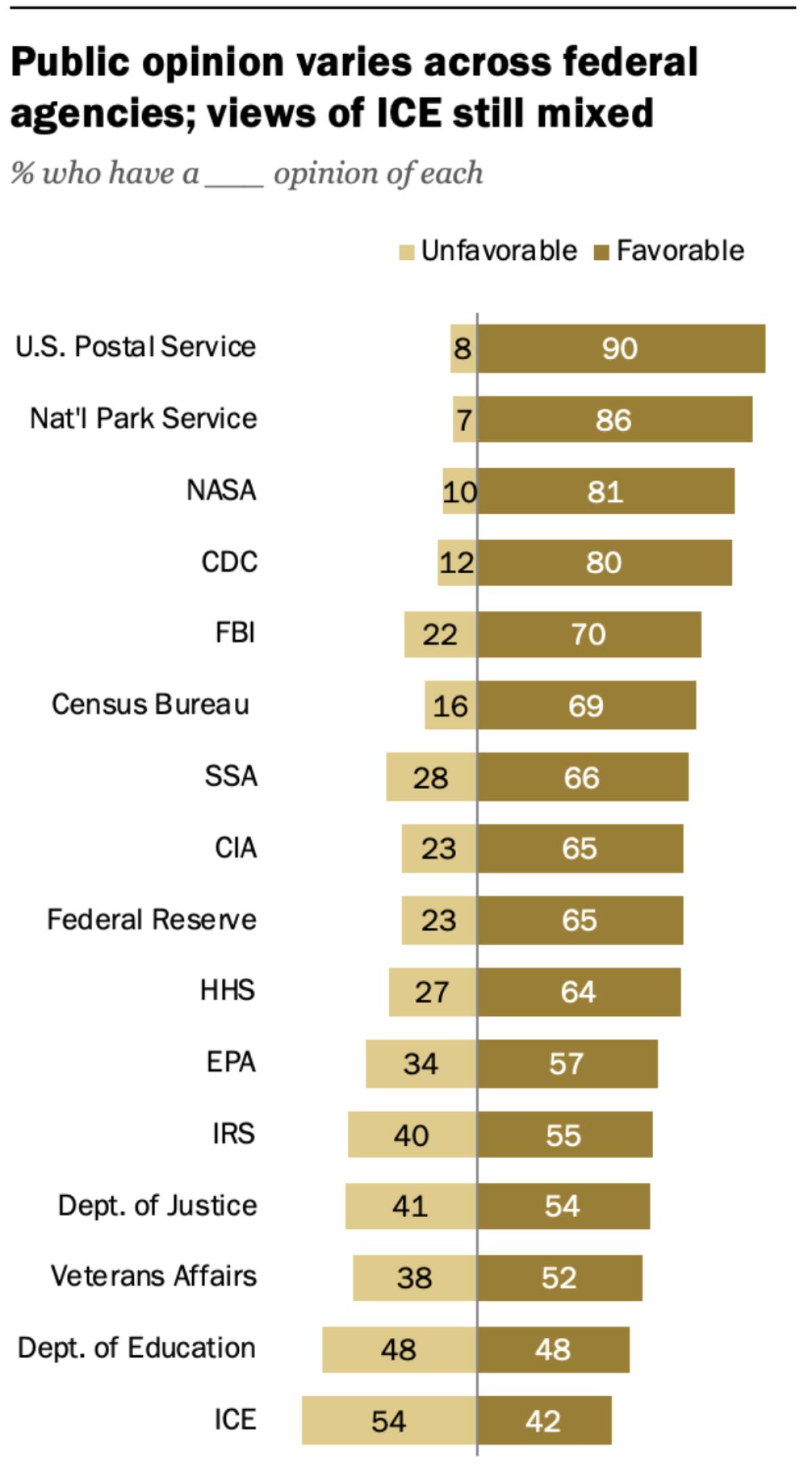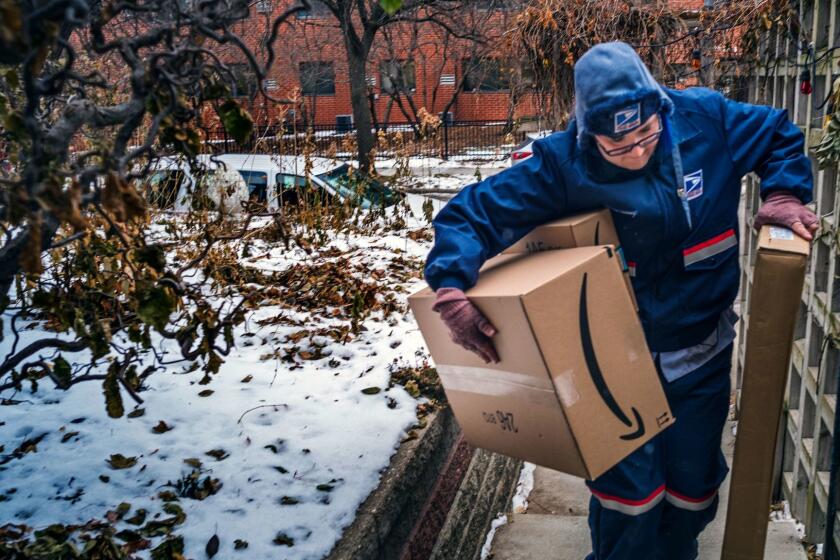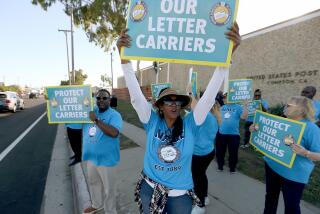Column: The Postal Service is America’s most popular government agency. Why does Trump hate it?
It’s time once again to stand up for the most popular government agency of all, the one that curiously has come under the most consistent attack by the Trump administration and its congressional henchpersons.
We’re talking about the U.S. Postal Service. According to a survey last year by the Pew Research Center, 90% of the public has a favorable view of the USPS, handily outdistancing even such other popular agencies as the National Park Service and NASA.
Yet the conservative drumbeat for privatizing this crucial service never seems to slacken, even though privatization, which would inevitably mean crummy service and immense price increases, would be the surest route to turning public admiration for the USPS into public scorn.
A privatized Postal Service would have a substantially lower cost structure ... and make business decisions free from political interference.
— Office of Management and Budget, 2017
The latest allusion to the privatization campaign came just after Christmas from Fortune, which predicted that privatization could happen as early as this year.
That’s almost certainly an overestimate, since fully privatizing the Postal Service might face constitutional issues and would certainly require action from Congress. Lawmakers tend to talk loudly about doing something about the Postal Service, but invariably quail even at incremental measures such as ending Saturday delivery or closing local post offices.
Taking advantage of his prerogative to comment on issues of government about which he has no apparent knowledge, President Trump last week Twitter-attacked the U.S.
But as Fortune reported, the Postal Service is entering 2020 effectively without leadership. Postmaster Gen. Megan Brennan, a 33-year veteran of the service who took up her post in 2015, is retiring this month.
The Postal Service says her departure is routine, but it’s proper to note that Trump hectored her relentlessly over such issues as the service’s consistent deficits and the fees it charges Amazon.com for package deliveries. Trump claimed that Amazon, which is controlled by his bete noire Jeff Bezos, was getting a sweetheart deal, which Brennan openly disputed.
Brennan’s successor will be chosen by the Postal Service Board of Governors, which has a Trump-appointed majority. The prospect of a privatization-happy choice is getting some pushback from the American Postal Workers Union and the National Assn. of Letter Carriers, which delivered an anti-privatization petition Wednesday with 450,000 signatures and boasted of support from other advocates of government services.

Among the latter were Nancy Altman, president of Social Security Works. “Social Security and the Postal Service are the face of the American government,” she said at the petition-delivery ceremony. “They are both beloved. They both work extremely well for the American people.”
So of course conservatives have their knives out for both.
There’s more going on here than the animosity of Donald Trump for Jeff Bezos, so let’s take a look.
To begin with, let’s not forget that as a government function, delivering the mail has a special status. Establishing “post offices and post roads” is one of the powers of Congress explicitly enumerated in the Constitution, right up there with the power to tax and borrow, declare war, coin money, establish federal courts and issue patents and copyrights.
That hasn’t kept Congress from doing its best to hamstring the Postal Service. The USPS consistently operates in the red, but as I’ve reported before, the major drag on its earnings is a 2006 congressional mandate that the service prepay over the following 10 years all its future expected retiree healthcare benefits.
Those payments totaled $38 billion through 2011, with further installments of between $5.6 billion and $11.1 billion a year due through 2016. The Postal Service stopped paying in 2012 because it didn’t have the money, but the accrued obligation, which was more than $47 billion as of the end of the 2019 fiscal year, still overhangs reported earnings.
The U.S. Postal Service might rightly be considered the sick man of government agencies.
Without the retiree health benefit obligation, the USPS would have eked out a modest operating profit every year since 2013, according to a report issued by a task force empaneled by Trump in 2018 and led by the Treasury Department.
As the task force reported to no one’s surprise, the structural challenge faced by the Postal Service comes from the long-term decline in what used to be its bread and butter, the delivery of first-class mail. First-class volume peaked at 103.7 billion pieces annually in 2001. As Americans switched to automatic bill payment, email and evites, volume fell 47% by fiscal 2019 to 54.9 billion.
Parcel deliveries have taken up some of the slack, rising in price, revenue and share of total USPS income over the last few years. But delivering packages is also more expensive than delivering letters. Parcels require additional heavier trucks, more personnel and more fuel. And although the USPS is collecting more in revenue from packages than it used to, that still is not fully compensating for the falloff in letter revenue.
That side of the business is what got under Trump’s skin in relation to Amazon. He asserted in a 2017 tweet that the service, which he erroneously called the United States Post Office, was being made “dumber and poorer” by undercharging Amazon. Brennan countered that the contract was fair and that, in any case, the rates were independently set by the Postal Regulatory Commission. Trump’s outburst was widely seen as an attack on Bezos for his ownership of the Washington Post.
Critics of the USPS say that there’s enough capacity from UPS, FedEx and other parcel firms to make USPS delivery unnecessary. But that’s plainly untrue. Because of the Postal Service’s mandate to provide universal delivery across the United States, no matter where, the commercial firms often rely on the Postal Service to deliver their packages to the last mile, especially when the last mile is in some remote, trackless waste.
Yet there’s a more fundamental flaw in the argument, voiced by the task force, that the USPS is on an “unsustainable financial path.” That might be so if it were a private company, but it’s not. It’s a government service, and among the virtues of a government service is that it shouldn’t have to turn a profit — the service it provides to all citizens no matter where they live can’t be done profitably. But why should it?
This is a concept that never seems to sink into the heads of the service’s critics. The result is that they’re led to some absurd and obnoxious conclusions. At the outset of the Trump administration, his Office of Management and Budget produced a report openly advocating privatization.
The OMB decried the service’s “extremely high fixed costs as a result of relatively generous employee benefits combined with a universal service obligation that is understood to require mail carriers to visit over 150 million addresses six days per week.” By contrast, the report said, “a privatized Postal Service would have a substantially lower cost structure, be able to adapt to changing customer needs and make business decisions free from political interference.”
In other words, it would cut pay and staffing, while abandoning customers and communities far from the beaten path. This is how free-market businesses such as cable operators work — they serve dense, high-population areas but keep remote places that are costly and difficult to serve out of their business plans.
“The private operation would be incentivized to innovate and improve services to Americans in every community,” the OMB report said. If you believe that, you’ll believe it every time a bank tells you it’s shutting your local branch and jacking up its account fees “to serve you better.”
The Postal Service, despite the decline in letter volume, still knits the country together. The dimmest of dim bulbs in Congress recognize that in their heart of hearts. That’s why they so seldom show the gumption to shut rural post offices down.
If there’s a government service that should absolutely not be “run like a business,” it’s delivering the mail. Treating universal mail service as something that must compete profitably with commercial carriers or die is a dumb and anti-democratic idea, and conservatives should just drop it.








